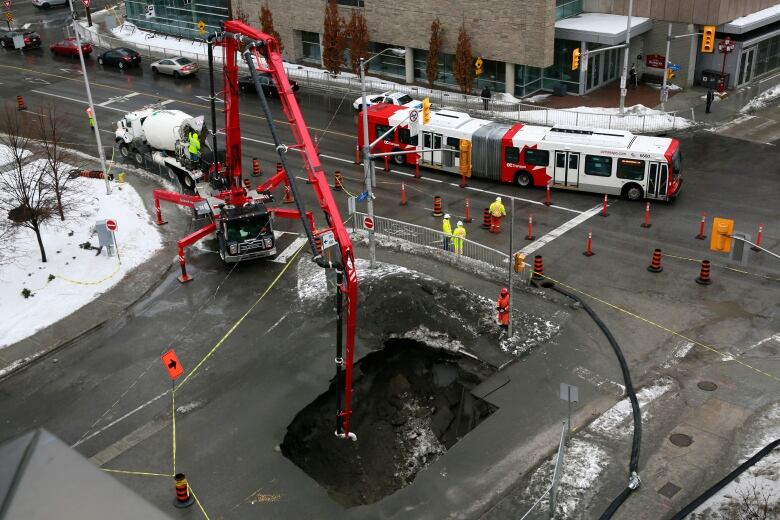City's leaders must acknowledge public's concerns over sinkholes
Lots of questions, few satisfying answers in wake of Wednesday's collapse on Rideau Street

At the second news conference on Ottawa's Rideau Street sinkhole in as many days, city officials had few answers.
- Ottawa's giant downtown sinkhole will take at least a week to fix, city says
- Van-ished: Locksmith watched as vehicle, tools slipped into sinkhole
What caused the giant, gaping hole in one of the city's major thoroughfares? Too early to say.
Was it related to the tunnel being bored underground for the LRT? Not sure.
Will it delay the light-rail project? And who'll pay for those delays? We'll get back to you.
But there was something else missing at Thursday's news event: public acknowledgement that we, as a city, were lucky that no one was hurt.
Bus passed minutes before collapse
There was only one moment during the 45-minute press conference where there was a modicum of recognition that a human disaster had been narrowly avoided.
That came when CBC reporter Steve Fischer asked about when the last OC Transpo bus passed over the piece of the street that is now a four-lane crater.

Reporters were told about when Rideau Street might be reopened (a week, if we're lucky) and how long an investigation may take (likely two months).
There was praise for first responders and workers who contained the sinkhole and scrambled to get hydro and gas services back up and running.
Both those utilities were reinstated by Thursday afternoon, although there was still a boil-water advisory in effect for a number of businesses near the Rideau-Sussex intersection, including those at the Rideau Centre, which was forced to close its food court.
'Sinkholes happen'
But what of Mayor Jim Watson's comment — uttered not just once, but twice — that can be boiled down to, "Sinkholes happen in cities?" If that's his strategy to make us all feel safer, it's a dubious one.
It's not that Watson is wrong about sinkholes, as Ottawans know all too well. In 2014, Waller Street collapsed at the eastern end of the downtown tunnel. There again, we were lucky no one was hurt.
And light rail tunnel-related sinkholes have occurred in other cities. (City officials were at pains Thursday to point out that no one knows yet if the sinkhole is related in some way to the tunnelling occurring under that exact location. If it's not related, that would be one stunning coincidence.)

But Watson appears to have taken the Vancouver example as a way to indicate that, by gosh, these things happen.
And while no one wants a leader who panics, we do want one who directly addresses our concerns. Or at least acknowledges that those concerns are valid.
During the Waller sinkhole incident, then deputy manager Nancy Schepers explicitly proclaimed that "we are very fortunate there were no injuries associated with the incident." It wasn't much, but at least it acknowledged the public's fears.
Failure to communicate over LRT
In Vancouver, public meetings were held where worried residents looking for reassurance could ask questions. Will Ottawa residents have that same opportunity?
And where was Rideau Transit Group at the city press conferences? There are questions we'd like to ask of the company actually building this $2-billion light rail thing we keep hearing so much about.
It was weeks after the Waller Street sinkhole incident before the media was able to speak with anyone from the consortium, and that was only after an investigation was complete.
A geological report prepared for RTG showed that digging beneath Rideau Street was going to be tricky. Was there any thought given to closing that part of Rideau during the tunnelling?
Just one more question no one has answered.

